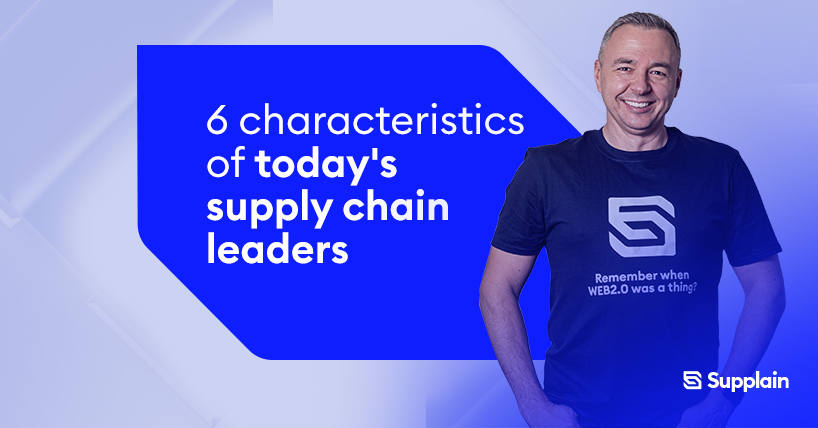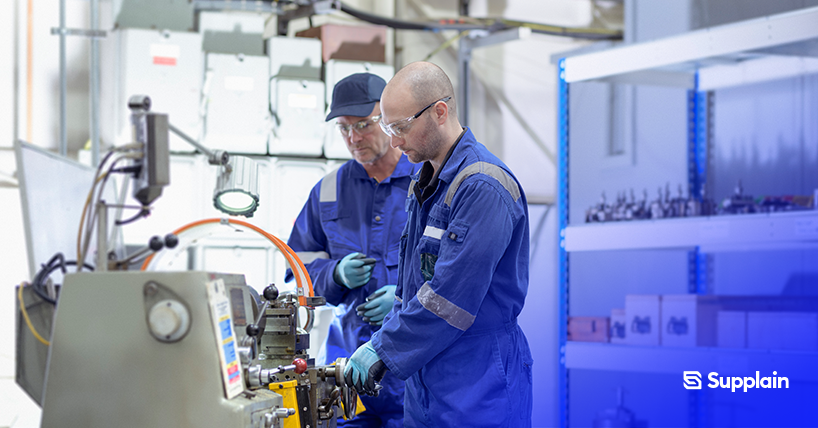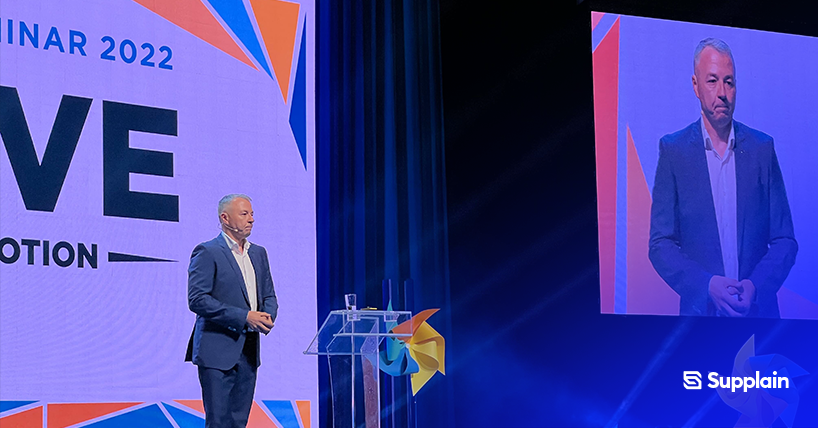
Previously, a supply chain leader was a tactical position with specific expertise in warehousing, shipping routes, logistics, customer demands and fuel costs.
Today, the supply chain leader profile is considerably different.
Supply chain leaders are strategic, focusing on the overall company, not just their part.
Supplains' very own supply chain leader, Aleksander Gansen, has noticed that global supply chains have to evolve, or they will not be resilient for today's world.
"Over the last few years, supply change leadership has changed dramatically. As the impact of the COVID-19 pandemic continues to influence the global supply chain, organisations are looking for innovative ways to build resilience and flexibility in their supply chains. Today's supply chain leaders must be agile and willing to embrace change to remain competitive and drive business." - Aleksander Gansen, Co-founder, Supplain.
What is a supply chain leader?
Supply chain leaders have evolved today, but traditionally, they facilitate logistics orchestration by delegating and hiring people with the right skills for the right jobs, training them to work best within their company's structure and network, and monitoring and upholding performance standards.
A good supply chain leader usually has sound maths skills combined with strong analytical and statistical capabilities to understand supply and demand issues. Furthermore, they typically can use data to track orders and shipments, sales trends, demand and any weaknesses and inefficiencies.
Aleksander has been in business since 1997. To him, the top supply chain leaders need to have or adopt the following supply chain characteristics.
1. Technological expertise

Technology adoption will only increase.
However, the good news is that supply chain technology is a supply chain leader's best friend.
For instance, automation technologies can streamline many routine day-to-day transactions. Analytics technologies can help leaders make data-driven decisions and assess demand to plan for the future. Connectivity software applications can improve visibility along the supply chain.
Supply chain leaders must understand the technology they're using and what's available on the market so they can speak confidently to vendors about their organisation's IT needs and advocate for technology solutions that support their goals. Doing this makes supply chain companies more innovative, faster, and more efficient decisions that positively impact operations.
2. Taking risks and being innovative
Not only must supply chain leaders think strategically, but they also need to be willing to take risks and constantly innovate to keep up and get ahead in an ever-changing world.
When discussing supply chain innovation, companies are searching to improve existing supply chain processes, including how information, data and finances move through supply chains.
Supply chain leaders must experiment if they are to boost operational efficiency, reduce costs, and influence the direction of the business. For instance, they might implement new technology like blockchain to gain more connectivity and visibility of their supply chain operations.
3. Being agile and adaptable

Supply chain leaders must have leading skills: flexibility and adaptability; they must react quickly to external factors to minimise risk. Being agile is critical due to the ever-changing nature of supply chain operations and the reality that processes don't always follow the best-laid plans.
Embrace change; don't resist it.
An agile supply chain means companies respond quickly to market changes, consumer demands, and new technologies. However, this may involve reworking your original plan or adopting new technology.
Creating digital twins, for example, can give a detailed simulation model of an actual supply chain, which uses real-time data and snapshots to forecast supply chain dynamics. From this, supply chain leaders can understand a supply chain's behaviour, predict abnormal situations, and devise an action plan.
4. Strategic thinking and leadership
Once leaders have the technology to assist them with day-to-day operations, this frees up time for them to do other organisational tasks, like supplier relationship management, strategic problem solving, and customer expectations.
After several years of delayed shipments, materials shortages, misplaced containers, and skyrocketing prices brought on by the pandemic, supply chain leaders are now becoming critical members of an organisation's leadership team.
They must prepare and implement new plans, fix problems along the way, and ensure everything continues running smoothly. They must communicate, coordinate, and collaborate effectively with their team members and external stakeholders.
5. Having a grasp of market dynamics
Supply chains change rapidly and occasionally unpredictably, in line with the market dynamics across many sectors, all of which are affected by rapid shifts in customer and consumer buying behaviour.
Several markets that used to be only local or regional have now become global, and so have the supply chains that serve them. Supply chain leaders must have a thorough understanding of the market dynamics of their industry and company to survive.
6. Having a heightened sense of ethics
As COVID-19 disrupted supply chains worldwide, people turned to buying locally-sourced goods and services. Where possible, organisations began purchasing from local vendors in their communities to bypass significant supply chain disruptions, such as delayed shipments.
Plus, more consumers are searching for more sustainable products and the supply chains that bring them. Sustainable business practices are integral at every supply chain step, from raw materials to production to delivery, looking out for practices of fraud, corruption, modern-day slavery, human trafficking, and broader issues like child labour.
Organisations must move toward more sustainably-friendly supply chains, setting up operational processes that are efficient, sustainable, and environmentally friendly.
The future of supply chain leadership

With organisations spending a large amount of money on their supply chains, the need for intelligent, strategic supply chain leaders is crucial.
Whether gathering business intelligence to help make better decisions or building relationships with suppliers and stakeholders, supply chain leaders require new skills above and beyond logistical knowledge.
Supply chain leadership is a rapidly-changing industry. Widespread technology adoption and global climate change will likely be top-of-mind for supply chain leaders in the coming years.
Therefore, being adaptable, using up-to-date technology, understanding current consumer trends, and having strong leadership skills will help supply chain leaders respond proactively to changes in the industry.
A good company understands the importance the supply chain plays in the success of the business and hires supply chain leaders with expanded roles who view the supply chain and the company comprehensively.
You can contact Aleksander through his LinkedIn profile if you're looking to share your concepts on supply chains.
About Aleksander Gansen
Aleksander has been an entrepreneur since high school, and building products and services are what drives him. He's also the co-founder of WOF Labs, a blockchain research and engineering company building Supplain protocol & World of Freight NFT ecosystem.
Before WOF Labs, he co-founded another logistics & supply chain management tool in 2014, Shipitwise, which was sold in 2019 to Speys.
For Aleksander, there is no separate "work-life" and "private life", as solving customers' problems is his passion and hobby at the same time. He doesn't call it a job but a calling. To be a better student, he constantly teaches what he has learned. Aleksander's passion is to share his humble experience with upstarts. When possible, he mentors the next generation of entrepreneurs.

![Here are the best NFT games [Updated List]](https://strapi.supplain.io/uploads/What_is_so_special_about_a_World_of_Freight_NFT_and_what_will_move_the_project_forward_b89946b520.png)
